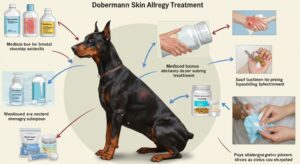Dobermanns are known for their sleek coats, loyal nature, and strong build. However, like many purebred dogs, they are also prone to specific health issues — one of the most common being skin allergies. If your Dobermann is constantly scratching, biting, or has patches of irritated skin, allergies could be the culprit. In this article, we’ll dive deep into Dobermann skin allergy treatments, explore their causes, and give you practical tips to relieve your dog’s discomfort.
What Causes Skin Allergies in Dobermanns?

Skin allergies in Dobermanns are typically triggered by environmental allergens, food sensitivities, or parasites. Understanding the root cause is the first step toward successful treatment.
1. Environmental Allergies (Atopic Dermatitis)
Dobermanns can be allergic to:
- Pollen
- Grass
- Mold spores
- Dust mites
These allergens often cause seasonal itching, redness, and inflammation.
2. Food Allergies
Some Dobermanns develop allergic reactions to specific ingredients in their food such as:
- Beef
- Chicken
- Dairy
- Wheat
- Soy
Symptoms may include chronic ear infections, diarrhea, and itchy skin.
3. Flea Allergy Dermatitis
This is one of the most common causes of itching in dogs. A single flea bite can trigger a severe allergic reaction in Dobermanns, leading to intense scratching and hair loss.
Common Symptoms of Skin Allergies in Dobermanns
Identifying early signs of skin allergies is crucial for timely treatment. Watch out for:
- Constant scratching or licking
- Red or inflamed skin
- Bald patches or thinning fur
- Scabs or hot spots
- Frequent ear infections
- Odor coming from the skin
If you notice these symptoms, consult your veterinarian to confirm the diagnosis and start a treatment plan.
Best Dobermann Skin Allergy Treatments
1. Veterinary Diagnosis
Always start with a vet visit. Your veterinarian may conduct:
- Skin scrapings
- Blood tests
- Intradermal allergy testing
- Elimination diets
Once the cause is determined, treatment becomes more targeted and effective.
2. Flea Control and Prevention
If fleas are the issue, immediate flea control is essential. Use:
- Monthly flea preventatives like NexGard, Bravecto, or Frontline
- Flea shampoos and sprays
- Regular vacuuming and washing of pet bedding
Preventing flea infestations is one of the simplest yet most effective ways to reduce allergic reactions.
3. Dietary Management
For food allergies, your vet may recommend a limited ingredient diet or a hypoallergenic prescription food. Key steps include:
- Switching to novel protein sources like duck, venison, or salmon
- Eliminating common allergens (beef, chicken, dairy, wheat)
- Introducing probiotics to support gut health
Stick to one food for at least 8–12 weeks to evaluate improvement.
4. Medications for Relief
Depending on the severity of the allergy, your vet might prescribe:
- Antihistamines (Benadryl, Zyrtec)
- Corticosteroids (for short-term relief of severe symptoms)
- Cytopoint injections (monthly, for itch relief)
- Apoquel tablets (daily, for controlling allergic itch)
These medications help manage symptoms while the underlying cause is addressed.
5. Topical Treatments
Soothe your Dobermann’s irritated skin with:
- Oatmeal baths (natural anti-inflammatory)
- Medicated shampoos (antibacterial or antifungal)
- Coconut oil (moisturizing and anti-microbial)
- Aloe vera gel (cooling and soothing)
Always ensure products are dog-safe and vet-approved.
6. Supplements for Skin Health
Supplements can boost your Dobermann’s immune response and improve skin condition. Consider:
- Omega-3 fatty acids (found in fish oil)
- Vitamin E (supports skin repair)
- Zinc (promotes healthy skin barrier)
- Probiotics (support gut and immune health)
These supplements should be added to your dog’s diet under veterinary supervision.
Natural Remedies You Can Try at Home
While vet-approved treatments are best, some natural remedies may complement them:
- Apple Cider Vinegar Spray: Mix equal parts ACV and water; spray on affected areas to reduce itching and kill bacteria.
- Chamomile Tea Rinse: Brew and cool chamomile tea, then use it as a rinse to calm inflamed skin.
- Colloidal Oatmeal Soaks: Helps reduce irritation and itching naturally.
Be sure to test any remedy on a small patch of skin first and discontinue if irritation occurs.
Preventing Future Skin Allergies in Dobermanns
Prevention is just as important as treatment. Keep your Dobermann allergy-free with these tips:
- Regular grooming to remove allergens from the coat
- Weekly ear cleaning to prevent infections
- High-quality diet with limited fillers and artificial additives
- Vacuuming and cleaning your home to reduce dust mites and allergens
- Using hypoallergenic dog beds and shampoos
A clean and allergen-free environment goes a long way in preventing flare-ups.
When to See a Vet
If your Dobermann shows signs of skin allergies that last more than a few days or worsen over time, seek veterinary attention immediately. Skin allergies can lead to infections, hair loss, and chronic discomfort if left untreated.
Final Thoughts
Dobermann skin allergies can be frustrating, but with the right approach, they’re highly manageable. By identifying the trigger, following a consistent treatment plan, and maintaining good skin hygiene, your Dobermann can enjoy a healthy, happy, and itch-free life.
Whether it’s switching up their diet, using vet-recommended medication, or trying gentle home remedies, remember: a well-cared-for Dobermann is a happy Dobermann.